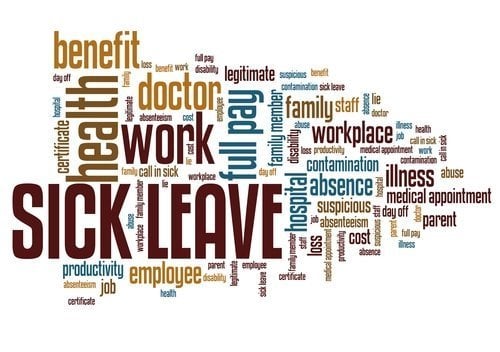There are a number of employment regulation actions which are gaining momentum all through the nation. Late final yr, we mentioned the “ban the field” motion that’s pushing laws that prohibits employers from together with prison historical past questions on purposes and locations different limitations on hiring people with prison pasts.
One other motion that’s gaining momentum is the obligatory sick depart motion. On March 9, 2016, Vermont’s governor signed a compulsory sick depart regulation making it the fifth state to require employers to offer sick depart to staff. Vermont joins California (see abstract), Connecticut (see abstract), Massachusetts (see abstract), and Oregon (abstract coming quickly). Along with these 5 states, there are at the moment 22 cities, together with Washington, DC (see abstract), and one county that require it (see A Higher Steadiness’s Overview of Paid Sick Time Legal guidelines for an excellent evaluation of every state, county, and metropolis sick depart regulation). There isn’t a motive to imagine that we’ve seen the final of the sick depart legal guidelines.
Under is a dialogue of a number of provisions which are widespread among the many numerous sick depart legal guidelines.
Paid vs. Unpaid Depart
Most of the sick depart legal guidelines permit sure teams of employers to offer unpaid sick depart whereas others should present paid sick depart. Whether or not an employer should present paid sick depart or unpaid sick depart is usually primarily based on what number of staff a enterprise has. A typical threshold is 10 staff, that means companies with fewer than 10 worker should solely present unpaid sick depart the place companies with 10 or extra should present paid sick depart. For instance, the California, Massachusetts, and Oregon sick depart legal guidelines all comprise this 10 worker threshold.
Accrual Methodology vs. Lump Sum Methodology
One other ingredient of many sick depart legal guidelines is that they permit employers to award sick depart to staff in two methods: accrual and lump sum. The accrual methodology requires employers to grant staff a sure variety of sick depart hours for a sure variety of hours labored. For instance, California requires employers who use the accrual methodology to grant staff one hour of sick depart for each 30 hours labored. The legal guidelines normally permit employers to cap the variety of hours staff could accrue in a yr. For instance, Connecticut employers could cap the variety of sick depart hours an worker could accrue in a yr at 40. With the accrual methodology, employers sometimes should permit staff to carryover some or all of their unused sick depart to the next yr.
The lump sum methodology requires employers to award staff a particular variety of hours of sick depart initially of every yr. For instance, in Massachusetts, companies should give staff 40 hours of sick depart initially of every yr in the event that they select the lump sum possibility. One of many advantages of the lump sum methodology is that companies will not be usually required to permit staff to carryover unused sick depart to following years. For a lot of, it is usually administratively simpler.
Sick Depart Use Caps
All sick depart legal guidelines permit companies to cap the variety of sick depart hours staff could use in a yr. The use caps underneath the 5 states and Washington, DC, sick depart legal guidelines are:
- California – 24 hours or 3 days, whichever is extra
- Connecticut – 40 hours
- Massachusetts – 40 hours
- Oregon – 40 hours
- Vermont – from 1/1/2017 to 12/31/2018: 24 hours; after 12/31/2018: 40 hours
- Washington, DC – 24 of fewer staff: 24 hours; 25-99 staff: 40 hours; 100 or extra staff: 56 hours
Permitted Makes use of
Sick depart legal guidelines sometimes outline the cases by which staff could use sick depart. These permitted makes use of usually embrace, however is probably not restricted to, the next:
- to take care of the worker’s personal bodily or psychological sickness, harm, or medical situation or preventative medical care;
- to take care of a member of the family’s bodily or psychological sickness, harm, or medical situation or preventative medical care;
- to take care of issues associated to home violence.
Curiously, some legal guidelines are extra beneficiant within the protection of relations. For instance, Washington, DC, consists of youngsters, grandchildren, spouses, spouses of kids, siblings, spouses of siblings, dad and mom, dad and mom of spouses/home companions, registered home companions, and individuals with whom an worker has a dedicated relationship and has shared a mutual residence for not less than the previous 12 months.. Massachusetts then again solely consists of youngsters, spouses, dad and mom, and in-laws.
Qualifying different depart insurance policies
Most sick depart legal guidelines permit employers to make use of trip, paid day without work, or different comparable depart insurance policies to satisfy their sick depart necessities. For these different depart insurance policies to be enough, they need to meet the minimal necessities of the related sick depart regulation, together with allowing staff to accrue the identical quantity of depart and use it underneath the identical circumstances. Some legal guidelines require these different insurance policies to comprise a provision informing staff that they won’t be offered additional sick depart past what’s offered within the qualifying different depart coverage.
Conclusion
Sadly, it’s unimaginable to cowl all the necessities and variations between the assorted sick depart legal guidelines on this article. It’s also protected to imagine that companies should keep vigilant as an increasing number of states, counties, and cities cross sick depart legal guidelines. Taking the time now to know whether or not your small business is failing to offer required sick depart is essential. When you need assistance on this endeavor, have questions on your sick depart obligations, or need assistance drafting a legally compliant sick depart coverage, please be at liberty to contact me at (678) 446-0865 or drew@employmentlawhandbook.com. We at EmploymentLawHandbook.com can be pleased to assist.


